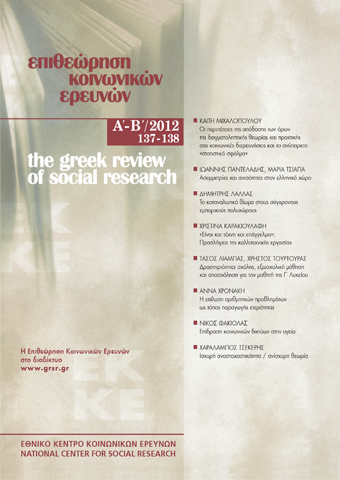Strong reflexivity / weak theory
Abstract
The methodological conception of reflexivity is often associated to qualitative research, multi-level meta-theoretical analyses and, in general, epistemological questions and answers. However, common («strong») reflexive thinking about knowledge and culture tends to arrogantly exclude alternative theorizations and to implicitly ignore the irreducibility of the «ethical dimension». The «reinvention» of this crucial dimension, within contemporary sociology and critical research, entails the substantial incorporation of the «weak» performative circular reasoning (Maturana/Varela, Luhmann), as well as a new reflexive ethos and aesthetic of epistemic humility. The issue here is indeed the fruitful pluralist maximization of both ethical and cognitive possibilities. In this respect, the innovative «it could be otherwise» clause of radical intellectual inquiry remains central to our theoretical world and self-accounts.
Article Details
- How to Cite
-
Τσέκερης Χ. (2012). Strong reflexivity / weak theory. The Greek Review of Social Research, 137, 233–251. https://doi.org/10.12681/grsr.26
- Issue
- 2012: 137-138, Α-Β
- Section
- Articles

This work is licensed under a Creative Commons Attribution-NonCommercial 4.0 International License.
Authors who publish with this journal agree to the following terms:
- Authors retain copyright and grant the journal right of first publication with the work simultaneously licensed under a Creative Commons Attribution Non-Commercial License that allows others to share the work with an acknowledgement of the work's authorship and initial publication in this journal.
- Authors are able to enter into separate, additional contractual arrangements for the non-exclusive distribution of the journal's published version of the work (e.g. post it to an institutional repository or publish it in a book), with an acknowledgement of its initial publication in this journal.
- Authors are permitted and encouraged to post their work online (preferably in institutional repositories or on their website) prior to and during the submission process, as it can lead to productive exchanges, as well as earlier and greater citation of published work (See The Effect of Open Access).
Downloads
Download data is not yet available.



